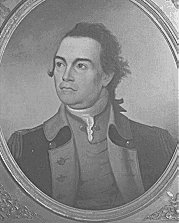Darkness Descends
December 1776 was truly a month that tested men's resolve. The British had been pressing the Continental Army since their invasion of Long Island in the summer. The "victory" at Harlem was the closest the struggling Americans came to stopping Lord Howe's advance. The only thing standing between Washington and an early British victory that could end the rebellion was, well, Lord Howe. His smart strategic moves, well-executed naval landings, precise tactics, and professional sieges characterized Howe's offensive. However, his slow movements allowed Washington to repeatedly slip free.
| Cornwallis crossed with five thousand crack troops to begin the rout through the Jerseys |
Winter Quarters
 |
| Lord Cornwallis |
By late December, Washington's army was safe across the Delaware River and prepared to defend the nation's capital, Philadelphia. He had fewer than 2500 effective troops, and that number would soon decrease as many enlistments ended in January, with the much-needed replacements not arriving until early the next year, if at all.
The Continental Army lacked supplies of all kinds, especially
clothing- not just winter gear, but any clothing at all! However, Washington had help from Howe, who halted General Cornwallis's 5,000 crack troops at the Delaware. Washington's men had confiscated every civilian boat for miles along the river, forcing Cornwallis to wait for the British pontoon trains before crossing.
Meanwhile, Howe, believing Washington was defeated, ordered his army into "winter quarters," and he himself hurried back to New York to be with his mistress. Cornwallis's wife was reportedly ill, and he headed to New York to catch a ship to England before winter made crossing impossible. To guard his New Jersey holdings, Howe left brigade-sized garrisons at Princeton, Brunswick, Bordentown, and Trenton.
An Army at rest and an Army formed
 |
| General John Sullivan |
As soon as he escaped Cornwallis' onslaught, Washington began to think about his next move. Congress abandoned the capital and fled to Baltimore. Congress also offered him near-dictatorial powers, which he refused. Then, the help he had counted on, and had previously dismissed, suddenly arrived. General John Sullivan, returned from British captivity, led the division of General Charles Lee across the Delaware and joined Washington near Yardley, New Jersey.
Washington then decided to proceed with his plan; he would gamble on a surprise attack against the British garrisons closest to the Delaware: Bordentown and Trenton. Washington's bold gamble required meticulous planning, daring, and a bit of luck. His first stroke of luck was Sullivan's arrival.
The second was his ability to persuade the troops to extend their enlistments long enough for his plan to succeed. Washington personally met with the men, and his sincerity and apparent dedication to them and the cause swayed just enough.
The third factor was the weather, and the last was maintaining the element of surprise during a period when not only Loyalists but even discouraged patriots might betray him to the British. Spies were everywhere.
The Crossing
Washington concealed his movements from Loyalist spies and led his army to McGonkey's Ferry on the evening of December 25th. The weather was cold with snow flurries, but the river had not yet frozen over. The crossing began after dark, but one delay followed another, throwing off Washington's schedule. He planned to march about nine miles downstream and surprise the Hessian garrison commanded by Colonel Johan Rall at dawn. The critical element was the guns. Henry Knox assured him he could get all 18 cannons across. However, the snow increased in intensity, and ice floes started to form. With each wave of boats crossing in the darkness, the risk grew. Yet, Colonel John Glover's Marblehead sailors, along with the renowned Gloucester Regiment, outperformed even the heroics of Long Island. A delay in crossing would not mean crossing denial—at least at McGonkey's. Further downriver, two other divisions of Pennsylvanians, under Generals Ewing and Cadwallader, were supposed to cross and take Bordentown, as well as assist at Trenton. But the ice floes thickened to the point where neither division could cross that night. This part of Washington's plan had failed.
The Miracle
Washington's forces did not fully cross until late at night. Then, they began the night march in two columns—one along the river road and the other, which Washington joined, moving further inland. The men, cold, wet, and exhausted, struggled across rugged, rocky, and wooded terrain. With limbs frozen and nearly blind from the elements, the soldiers used patches of white paper to guide them in the dark.
All the time, Washington hoped the other columns could cross without being detected and that the Hessians would not be alerted and waiting. His worst fears were confirmed in the first case, but his greatest hopes came true in the second. Arriving well into the early morning light, the Americans were surprised to find the small town still asleep and the weather clearing. The sound of a cannon signaled the two-pronged attack.
Surprised, the Hessian professionals formed up as best they could to meet the invaders, but within an hour, the battle was over. Rall, the enemy commander, was mortally wounded, and his men soon surrendered. Not a single American died, and only a few were wounded. Washington's gamble succeeded... but his winter campaign was only just beginning.
 |
| Continentals rush a Hessian gun to open the battle |


